Advantages and Concerns of Customer Relationship Management (CRM)
VerifiedAdded on 2023/01/09
|10
|2500
|32
AI Summary
This article discusses the advantages and concerns of Customer Relationship Management (CRM). It highlights the benefits of CRM in improving customer relationships, understanding customer preferences, and enhancing sales and marketing performance. The article also addresses the concerns of high implementation costs, potential data loss, and failure due to lack of management support and employee resistance. It emphasizes the importance of proper planning, training, and support for successful CRM implementation.
Contribute Materials
Your contribution can guide someone’s learning journey. Share your
documents today.
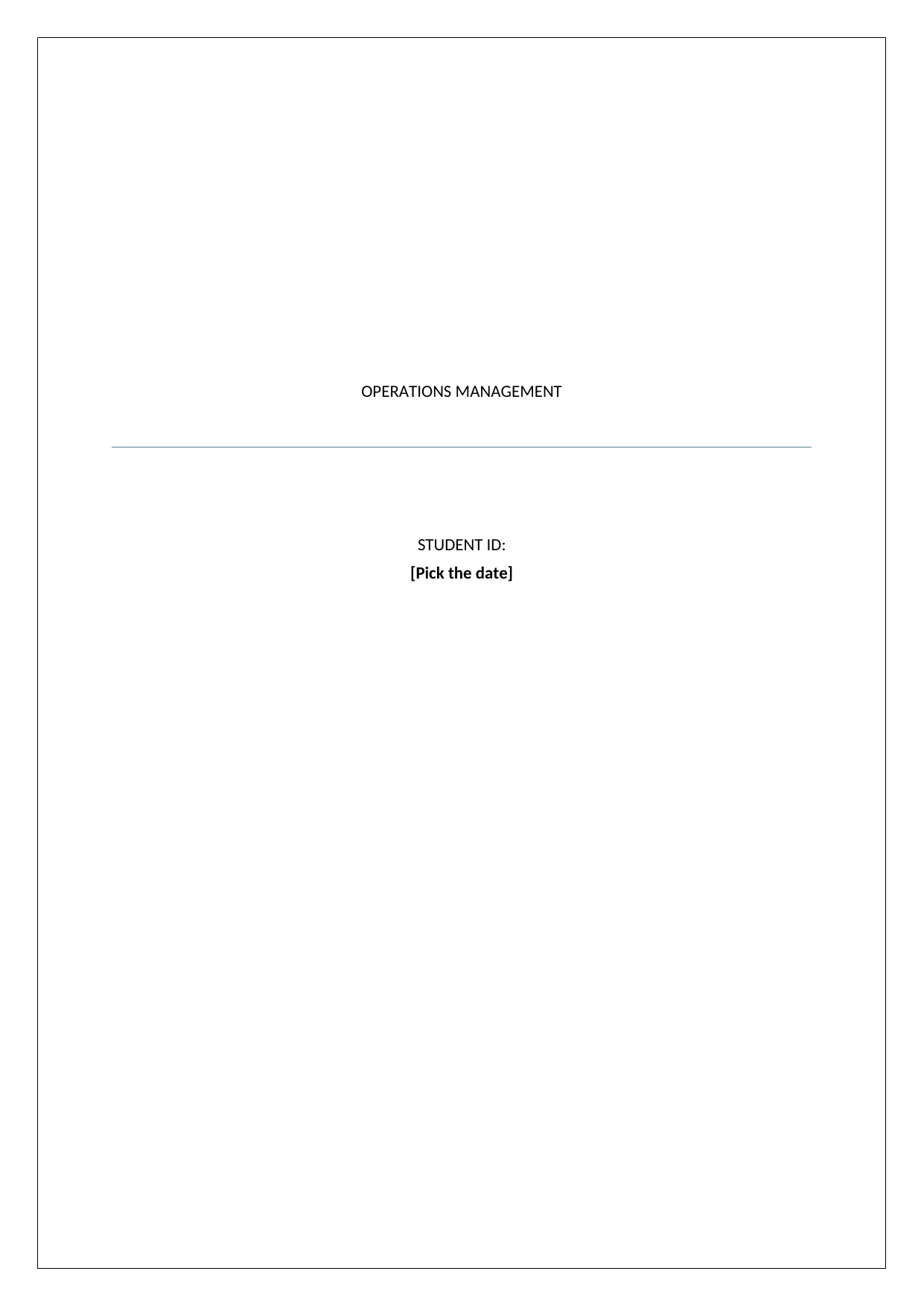
OPERATIONS MANAGEMENT
STUDENT ID:
[Pick the date]
STUDENT ID:
[Pick the date]
Secure Best Marks with AI Grader
Need help grading? Try our AI Grader for instant feedback on your assignments.
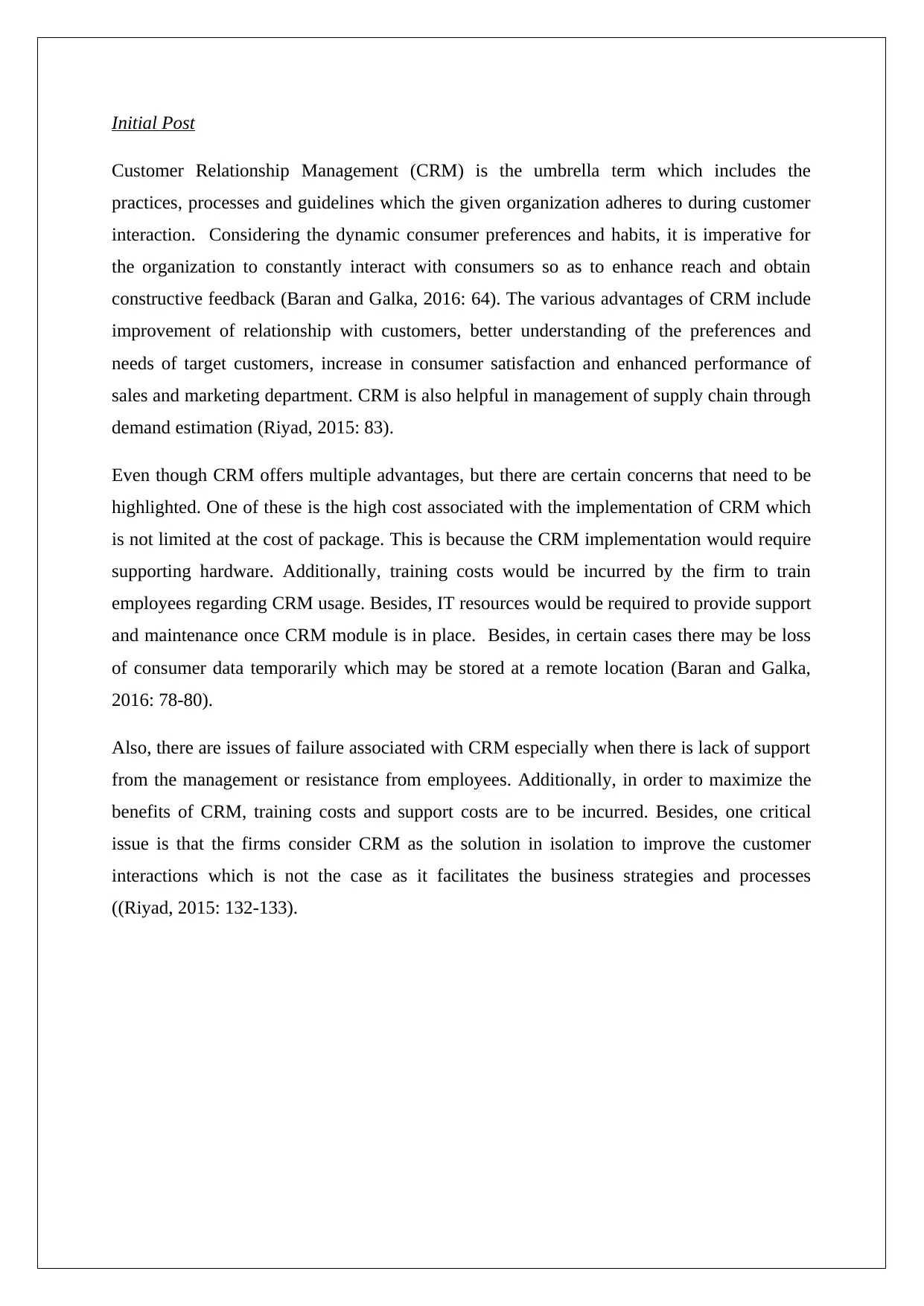
Initial Post
Customer Relationship Management (CRM) is the umbrella term which includes the
practices, processes and guidelines which the given organization adheres to during customer
interaction. Considering the dynamic consumer preferences and habits, it is imperative for
the organization to constantly interact with consumers so as to enhance reach and obtain
constructive feedback (Baran and Galka, 2016: 64). The various advantages of CRM include
improvement of relationship with customers, better understanding of the preferences and
needs of target customers, increase in consumer satisfaction and enhanced performance of
sales and marketing department. CRM is also helpful in management of supply chain through
demand estimation (Riyad, 2015: 83).
Even though CRM offers multiple advantages, but there are certain concerns that need to be
highlighted. One of these is the high cost associated with the implementation of CRM which
is not limited at the cost of package. This is because the CRM implementation would require
supporting hardware. Additionally, training costs would be incurred by the firm to train
employees regarding CRM usage. Besides, IT resources would be required to provide support
and maintenance once CRM module is in place. Besides, in certain cases there may be loss
of consumer data temporarily which may be stored at a remote location (Baran and Galka,
2016: 78-80).
Also, there are issues of failure associated with CRM especially when there is lack of support
from the management or resistance from employees. Additionally, in order to maximize the
benefits of CRM, training costs and support costs are to be incurred. Besides, one critical
issue is that the firms consider CRM as the solution in isolation to improve the customer
interactions which is not the case as it facilitates the business strategies and processes
((Riyad, 2015: 132-133).
Customer Relationship Management (CRM) is the umbrella term which includes the
practices, processes and guidelines which the given organization adheres to during customer
interaction. Considering the dynamic consumer preferences and habits, it is imperative for
the organization to constantly interact with consumers so as to enhance reach and obtain
constructive feedback (Baran and Galka, 2016: 64). The various advantages of CRM include
improvement of relationship with customers, better understanding of the preferences and
needs of target customers, increase in consumer satisfaction and enhanced performance of
sales and marketing department. CRM is also helpful in management of supply chain through
demand estimation (Riyad, 2015: 83).
Even though CRM offers multiple advantages, but there are certain concerns that need to be
highlighted. One of these is the high cost associated with the implementation of CRM which
is not limited at the cost of package. This is because the CRM implementation would require
supporting hardware. Additionally, training costs would be incurred by the firm to train
employees regarding CRM usage. Besides, IT resources would be required to provide support
and maintenance once CRM module is in place. Besides, in certain cases there may be loss
of consumer data temporarily which may be stored at a remote location (Baran and Galka,
2016: 78-80).
Also, there are issues of failure associated with CRM especially when there is lack of support
from the management or resistance from employees. Additionally, in order to maximize the
benefits of CRM, training costs and support costs are to be incurred. Besides, one critical
issue is that the firms consider CRM as the solution in isolation to improve the customer
interactions which is not the case as it facilitates the business strategies and processes
((Riyad, 2015: 132-133).
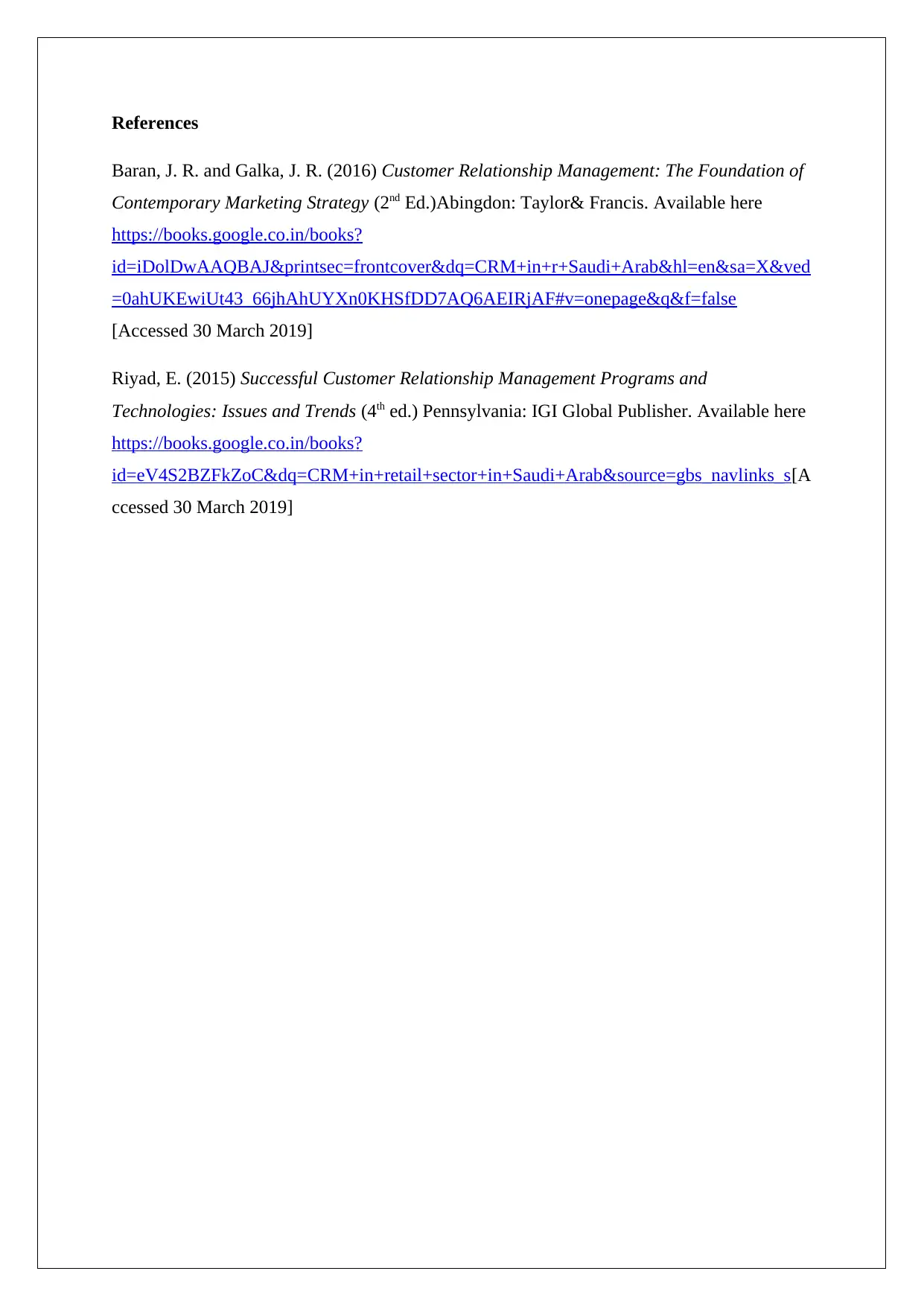
References
Baran, J. R. and Galka, J. R. (2016) Customer Relationship Management: The Foundation of
Contemporary Marketing Strategy (2nd Ed.)Abingdon: Taylor& Francis. Available here
https://books.google.co.in/books?
id=iDolDwAAQBAJ&printsec=frontcover&dq=CRM+in+r+Saudi+Arab&hl=en&sa=X&ved
=0ahUKEwiUt43_66jhAhUYXn0KHSfDD7AQ6AEIRjAF#v=onepage&q&f=false
[Accessed 30 March 2019]
Riyad, E. (2015) Successful Customer Relationship Management Programs and
Technologies: Issues and Trends (4th ed.) Pennsylvania: IGI Global Publisher. Available here
https://books.google.co.in/books?
id=eV4S2BZFkZoC&dq=CRM+in+retail+sector+in+Saudi+Arab&source=gbs_navlinks_s[A
ccessed 30 March 2019]
Baran, J. R. and Galka, J. R. (2016) Customer Relationship Management: The Foundation of
Contemporary Marketing Strategy (2nd Ed.)Abingdon: Taylor& Francis. Available here
https://books.google.co.in/books?
id=iDolDwAAQBAJ&printsec=frontcover&dq=CRM+in+r+Saudi+Arab&hl=en&sa=X&ved
=0ahUKEwiUt43_66jhAhUYXn0KHSfDD7AQ6AEIRjAF#v=onepage&q&f=false
[Accessed 30 March 2019]
Riyad, E. (2015) Successful Customer Relationship Management Programs and
Technologies: Issues and Trends (4th ed.) Pennsylvania: IGI Global Publisher. Available here
https://books.google.co.in/books?
id=eV4S2BZFkZoC&dq=CRM+in+retail+sector+in+Saudi+Arab&source=gbs_navlinks_s[A
ccessed 30 March 2019]
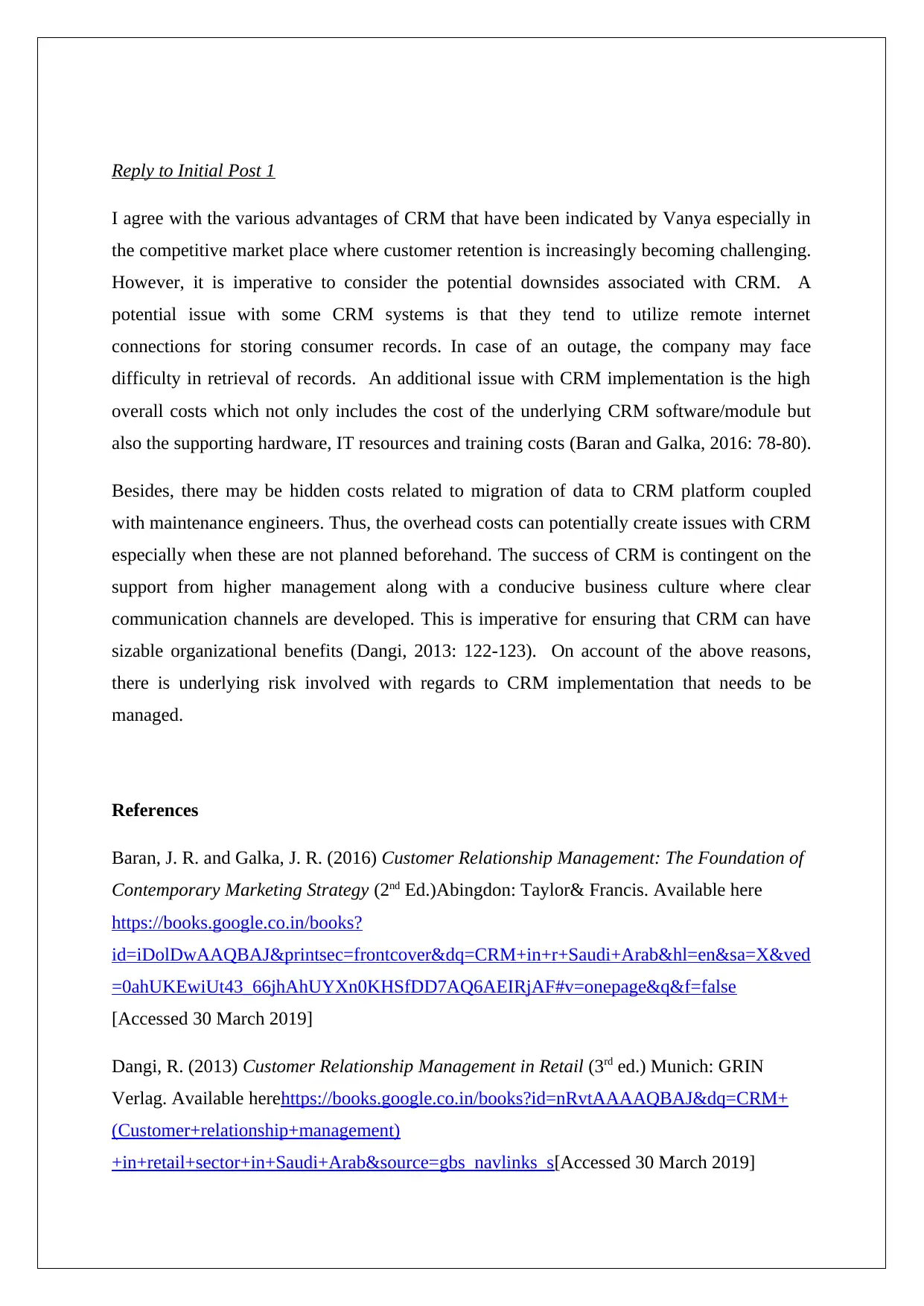
Reply to Initial Post 1
I agree with the various advantages of CRM that have been indicated by Vanya especially in
the competitive market place where customer retention is increasingly becoming challenging.
However, it is imperative to consider the potential downsides associated with CRM. A
potential issue with some CRM systems is that they tend to utilize remote internet
connections for storing consumer records. In case of an outage, the company may face
difficulty in retrieval of records. An additional issue with CRM implementation is the high
overall costs which not only includes the cost of the underlying CRM software/module but
also the supporting hardware, IT resources and training costs (Baran and Galka, 2016: 78-80).
Besides, there may be hidden costs related to migration of data to CRM platform coupled
with maintenance engineers. Thus, the overhead costs can potentially create issues with CRM
especially when these are not planned beforehand. The success of CRM is contingent on the
support from higher management along with a conducive business culture where clear
communication channels are developed. This is imperative for ensuring that CRM can have
sizable organizational benefits (Dangi, 2013: 122-123). On account of the above reasons,
there is underlying risk involved with regards to CRM implementation that needs to be
managed.
References
Baran, J. R. and Galka, J. R. (2016) Customer Relationship Management: The Foundation of
Contemporary Marketing Strategy (2nd Ed.)Abingdon: Taylor& Francis. Available here
https://books.google.co.in/books?
id=iDolDwAAQBAJ&printsec=frontcover&dq=CRM+in+r+Saudi+Arab&hl=en&sa=X&ved
=0ahUKEwiUt43_66jhAhUYXn0KHSfDD7AQ6AEIRjAF#v=onepage&q&f=false
[Accessed 30 March 2019]
Dangi, R. (2013) Customer Relationship Management in Retail (3rd ed.) Munich: GRIN
Verlag. Available herehttps://books.google.co.in/books?id=nRvtAAAAQBAJ&dq=CRM+
(Customer+relationship+management)
+in+retail+sector+in+Saudi+Arab&source=gbs_navlinks_s[Accessed 30 March 2019]
I agree with the various advantages of CRM that have been indicated by Vanya especially in
the competitive market place where customer retention is increasingly becoming challenging.
However, it is imperative to consider the potential downsides associated with CRM. A
potential issue with some CRM systems is that they tend to utilize remote internet
connections for storing consumer records. In case of an outage, the company may face
difficulty in retrieval of records. An additional issue with CRM implementation is the high
overall costs which not only includes the cost of the underlying CRM software/module but
also the supporting hardware, IT resources and training costs (Baran and Galka, 2016: 78-80).
Besides, there may be hidden costs related to migration of data to CRM platform coupled
with maintenance engineers. Thus, the overhead costs can potentially create issues with CRM
especially when these are not planned beforehand. The success of CRM is contingent on the
support from higher management along with a conducive business culture where clear
communication channels are developed. This is imperative for ensuring that CRM can have
sizable organizational benefits (Dangi, 2013: 122-123). On account of the above reasons,
there is underlying risk involved with regards to CRM implementation that needs to be
managed.
References
Baran, J. R. and Galka, J. R. (2016) Customer Relationship Management: The Foundation of
Contemporary Marketing Strategy (2nd Ed.)Abingdon: Taylor& Francis. Available here
https://books.google.co.in/books?
id=iDolDwAAQBAJ&printsec=frontcover&dq=CRM+in+r+Saudi+Arab&hl=en&sa=X&ved
=0ahUKEwiUt43_66jhAhUYXn0KHSfDD7AQ6AEIRjAF#v=onepage&q&f=false
[Accessed 30 March 2019]
Dangi, R. (2013) Customer Relationship Management in Retail (3rd ed.) Munich: GRIN
Verlag. Available herehttps://books.google.co.in/books?id=nRvtAAAAQBAJ&dq=CRM+
(Customer+relationship+management)
+in+retail+sector+in+Saudi+Arab&source=gbs_navlinks_s[Accessed 30 March 2019]
Secure Best Marks with AI Grader
Need help grading? Try our AI Grader for instant feedback on your assignments.
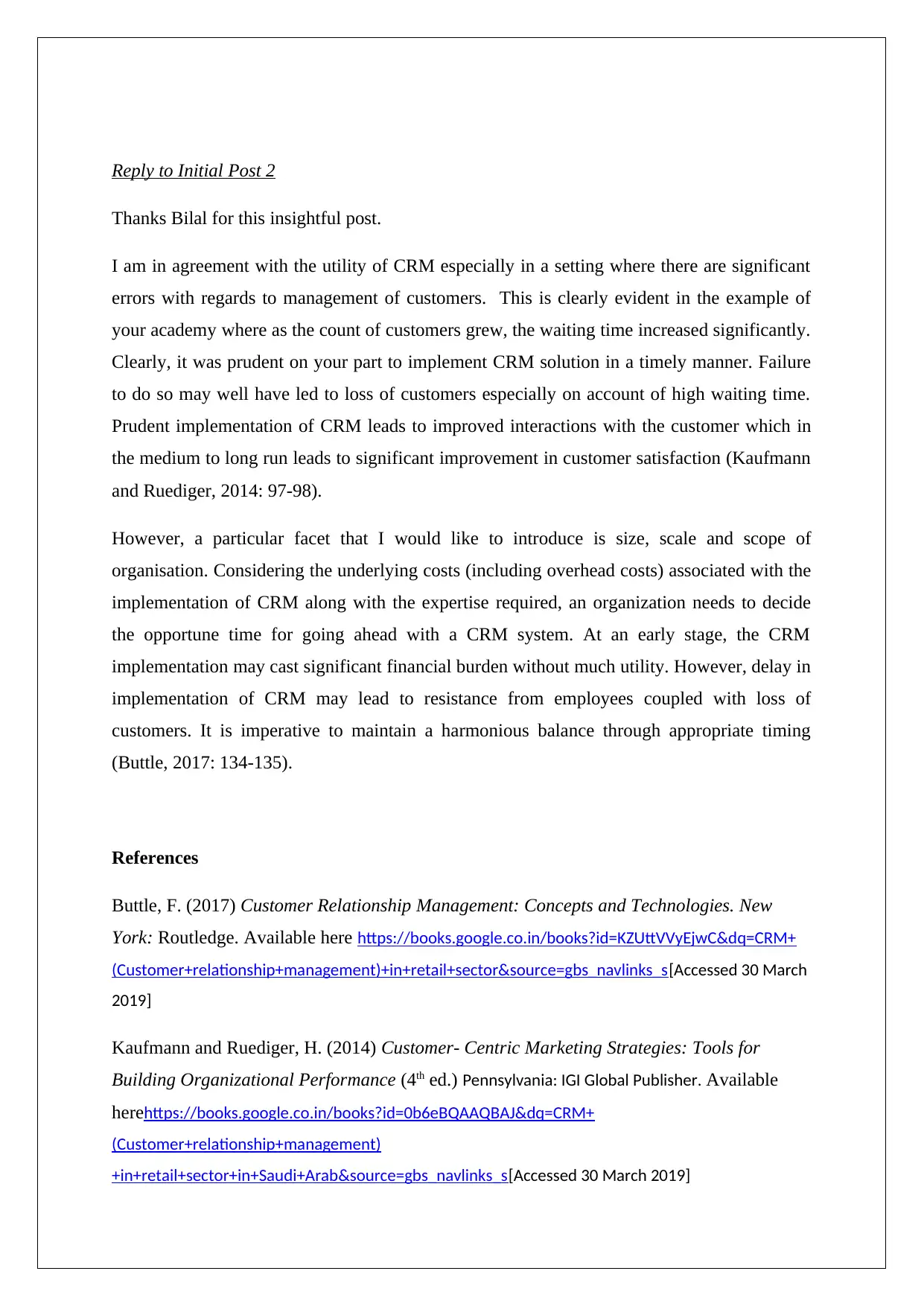
Reply to Initial Post 2
Thanks Bilal for this insightful post.
I am in agreement with the utility of CRM especially in a setting where there are significant
errors with regards to management of customers. This is clearly evident in the example of
your academy where as the count of customers grew, the waiting time increased significantly.
Clearly, it was prudent on your part to implement CRM solution in a timely manner. Failure
to do so may well have led to loss of customers especially on account of high waiting time.
Prudent implementation of CRM leads to improved interactions with the customer which in
the medium to long run leads to significant improvement in customer satisfaction (Kaufmann
and Ruediger, 2014: 97-98).
However, a particular facet that I would like to introduce is size, scale and scope of
organisation. Considering the underlying costs (including overhead costs) associated with the
implementation of CRM along with the expertise required, an organization needs to decide
the opportune time for going ahead with a CRM system. At an early stage, the CRM
implementation may cast significant financial burden without much utility. However, delay in
implementation of CRM may lead to resistance from employees coupled with loss of
customers. It is imperative to maintain a harmonious balance through appropriate timing
(Buttle, 2017: 134-135).
References
Buttle, F. (2017) Customer Relationship Management: Concepts and Technologies. New
York: Routledge. Available here https://books.google.co.in/books?id=KZUttVVyEjwC&dq=CRM+
(Customer+relationship+management)+in+retail+sector&source=gbs_navlinks_s[Accessed 30 March
2019]
Kaufmann and Ruediger, H. (2014) Customer- Centric Marketing Strategies: Tools for
Building Organizational Performance (4th ed.) Pennsylvania: IGI Global Publisher. Available
herehttps://books.google.co.in/books?id=0b6eBQAAQBAJ&dq=CRM+
(Customer+relationship+management)
+in+retail+sector+in+Saudi+Arab&source=gbs_navlinks_s[Accessed 30 March 2019]
Thanks Bilal for this insightful post.
I am in agreement with the utility of CRM especially in a setting where there are significant
errors with regards to management of customers. This is clearly evident in the example of
your academy where as the count of customers grew, the waiting time increased significantly.
Clearly, it was prudent on your part to implement CRM solution in a timely manner. Failure
to do so may well have led to loss of customers especially on account of high waiting time.
Prudent implementation of CRM leads to improved interactions with the customer which in
the medium to long run leads to significant improvement in customer satisfaction (Kaufmann
and Ruediger, 2014: 97-98).
However, a particular facet that I would like to introduce is size, scale and scope of
organisation. Considering the underlying costs (including overhead costs) associated with the
implementation of CRM along with the expertise required, an organization needs to decide
the opportune time for going ahead with a CRM system. At an early stage, the CRM
implementation may cast significant financial burden without much utility. However, delay in
implementation of CRM may lead to resistance from employees coupled with loss of
customers. It is imperative to maintain a harmonious balance through appropriate timing
(Buttle, 2017: 134-135).
References
Buttle, F. (2017) Customer Relationship Management: Concepts and Technologies. New
York: Routledge. Available here https://books.google.co.in/books?id=KZUttVVyEjwC&dq=CRM+
(Customer+relationship+management)+in+retail+sector&source=gbs_navlinks_s[Accessed 30 March
2019]
Kaufmann and Ruediger, H. (2014) Customer- Centric Marketing Strategies: Tools for
Building Organizational Performance (4th ed.) Pennsylvania: IGI Global Publisher. Available
herehttps://books.google.co.in/books?id=0b6eBQAAQBAJ&dq=CRM+
(Customer+relationship+management)
+in+retail+sector+in+Saudi+Arab&source=gbs_navlinks_s[Accessed 30 March 2019]
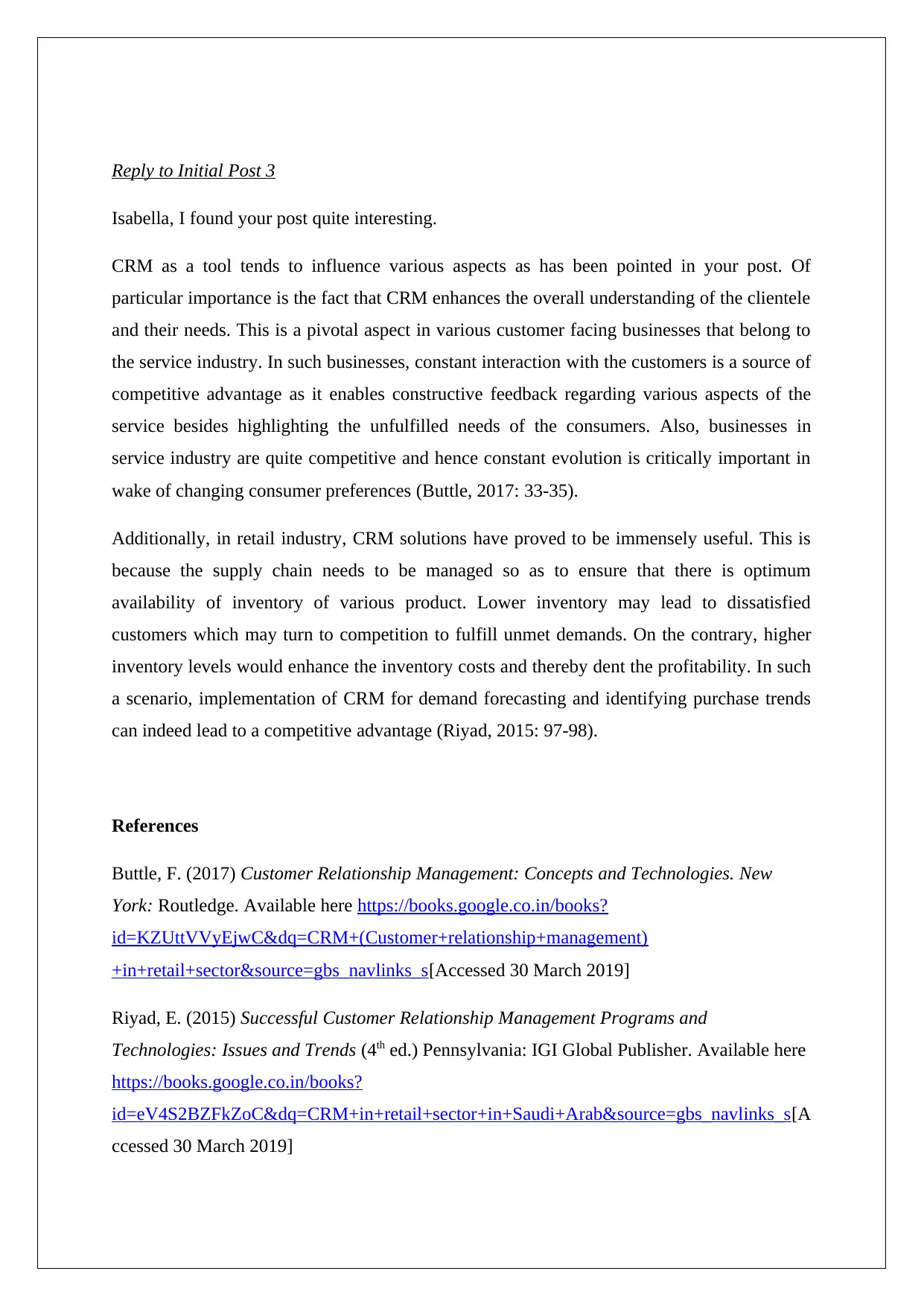
Reply to Initial Post 3
Isabella, I found your post quite interesting.
CRM as a tool tends to influence various aspects as has been pointed in your post. Of
particular importance is the fact that CRM enhances the overall understanding of the clientele
and their needs. This is a pivotal aspect in various customer facing businesses that belong to
the service industry. In such businesses, constant interaction with the customers is a source of
competitive advantage as it enables constructive feedback regarding various aspects of the
service besides highlighting the unfulfilled needs of the consumers. Also, businesses in
service industry are quite competitive and hence constant evolution is critically important in
wake of changing consumer preferences (Buttle, 2017: 33-35).
Additionally, in retail industry, CRM solutions have proved to be immensely useful. This is
because the supply chain needs to be managed so as to ensure that there is optimum
availability of inventory of various product. Lower inventory may lead to dissatisfied
customers which may turn to competition to fulfill unmet demands. On the contrary, higher
inventory levels would enhance the inventory costs and thereby dent the profitability. In such
a scenario, implementation of CRM for demand forecasting and identifying purchase trends
can indeed lead to a competitive advantage (Riyad, 2015: 97-98).
References
Buttle, F. (2017) Customer Relationship Management: Concepts and Technologies. New
York: Routledge. Available here https://books.google.co.in/books?
id=KZUttVVyEjwC&dq=CRM+(Customer+relationship+management)
+in+retail+sector&source=gbs_navlinks_s[Accessed 30 March 2019]
Riyad, E. (2015) Successful Customer Relationship Management Programs and
Technologies: Issues and Trends (4th ed.) Pennsylvania: IGI Global Publisher. Available here
https://books.google.co.in/books?
id=eV4S2BZFkZoC&dq=CRM+in+retail+sector+in+Saudi+Arab&source=gbs_navlinks_s[A
ccessed 30 March 2019]
Isabella, I found your post quite interesting.
CRM as a tool tends to influence various aspects as has been pointed in your post. Of
particular importance is the fact that CRM enhances the overall understanding of the clientele
and their needs. This is a pivotal aspect in various customer facing businesses that belong to
the service industry. In such businesses, constant interaction with the customers is a source of
competitive advantage as it enables constructive feedback regarding various aspects of the
service besides highlighting the unfulfilled needs of the consumers. Also, businesses in
service industry are quite competitive and hence constant evolution is critically important in
wake of changing consumer preferences (Buttle, 2017: 33-35).
Additionally, in retail industry, CRM solutions have proved to be immensely useful. This is
because the supply chain needs to be managed so as to ensure that there is optimum
availability of inventory of various product. Lower inventory may lead to dissatisfied
customers which may turn to competition to fulfill unmet demands. On the contrary, higher
inventory levels would enhance the inventory costs and thereby dent the profitability. In such
a scenario, implementation of CRM for demand forecasting and identifying purchase trends
can indeed lead to a competitive advantage (Riyad, 2015: 97-98).
References
Buttle, F. (2017) Customer Relationship Management: Concepts and Technologies. New
York: Routledge. Available here https://books.google.co.in/books?
id=KZUttVVyEjwC&dq=CRM+(Customer+relationship+management)
+in+retail+sector&source=gbs_navlinks_s[Accessed 30 March 2019]
Riyad, E. (2015) Successful Customer Relationship Management Programs and
Technologies: Issues and Trends (4th ed.) Pennsylvania: IGI Global Publisher. Available here
https://books.google.co.in/books?
id=eV4S2BZFkZoC&dq=CRM+in+retail+sector+in+Saudi+Arab&source=gbs_navlinks_s[A
ccessed 30 March 2019]
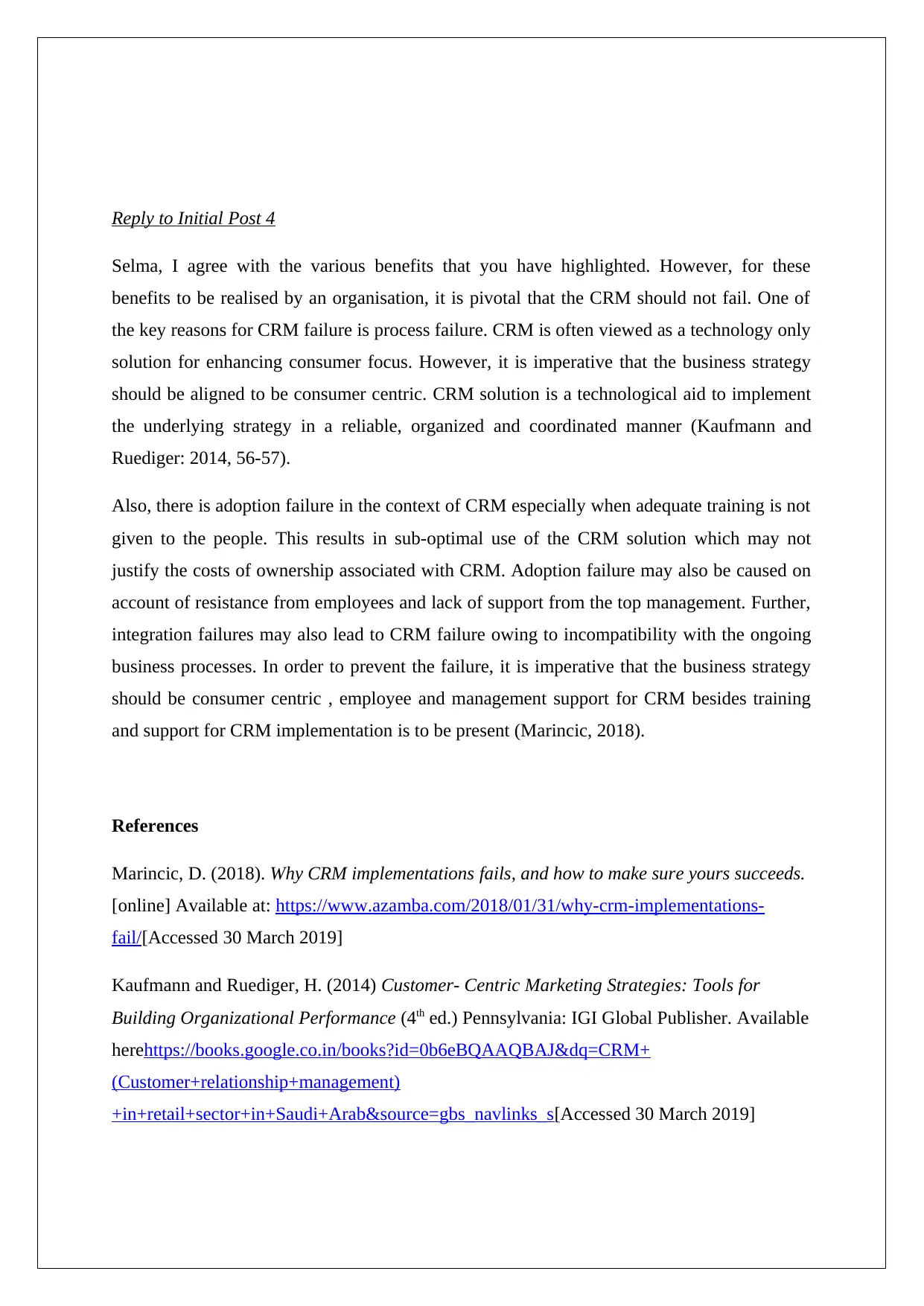
Reply to Initial Post 4
Selma, I agree with the various benefits that you have highlighted. However, for these
benefits to be realised by an organisation, it is pivotal that the CRM should not fail. One of
the key reasons for CRM failure is process failure. CRM is often viewed as a technology only
solution for enhancing consumer focus. However, it is imperative that the business strategy
should be aligned to be consumer centric. CRM solution is a technological aid to implement
the underlying strategy in a reliable, organized and coordinated manner (Kaufmann and
Ruediger: 2014, 56-57).
Also, there is adoption failure in the context of CRM especially when adequate training is not
given to the people. This results in sub-optimal use of the CRM solution which may not
justify the costs of ownership associated with CRM. Adoption failure may also be caused on
account of resistance from employees and lack of support from the top management. Further,
integration failures may also lead to CRM failure owing to incompatibility with the ongoing
business processes. In order to prevent the failure, it is imperative that the business strategy
should be consumer centric , employee and management support for CRM besides training
and support for CRM implementation is to be present (Marincic, 2018).
References
Marincic, D. (2018). Why CRM implementations fails, and how to make sure yours succeeds.
[online] Available at: https://www.azamba.com/2018/01/31/why-crm-implementations-
fail/[Accessed 30 March 2019]
Kaufmann and Ruediger, H. (2014) Customer- Centric Marketing Strategies: Tools for
Building Organizational Performance (4th ed.) Pennsylvania: IGI Global Publisher. Available
herehttps://books.google.co.in/books?id=0b6eBQAAQBAJ&dq=CRM+
(Customer+relationship+management)
+in+retail+sector+in+Saudi+Arab&source=gbs_navlinks_s[Accessed 30 March 2019]
Selma, I agree with the various benefits that you have highlighted. However, for these
benefits to be realised by an organisation, it is pivotal that the CRM should not fail. One of
the key reasons for CRM failure is process failure. CRM is often viewed as a technology only
solution for enhancing consumer focus. However, it is imperative that the business strategy
should be aligned to be consumer centric. CRM solution is a technological aid to implement
the underlying strategy in a reliable, organized and coordinated manner (Kaufmann and
Ruediger: 2014, 56-57).
Also, there is adoption failure in the context of CRM especially when adequate training is not
given to the people. This results in sub-optimal use of the CRM solution which may not
justify the costs of ownership associated with CRM. Adoption failure may also be caused on
account of resistance from employees and lack of support from the top management. Further,
integration failures may also lead to CRM failure owing to incompatibility with the ongoing
business processes. In order to prevent the failure, it is imperative that the business strategy
should be consumer centric , employee and management support for CRM besides training
and support for CRM implementation is to be present (Marincic, 2018).
References
Marincic, D. (2018). Why CRM implementations fails, and how to make sure yours succeeds.
[online] Available at: https://www.azamba.com/2018/01/31/why-crm-implementations-
fail/[Accessed 30 March 2019]
Kaufmann and Ruediger, H. (2014) Customer- Centric Marketing Strategies: Tools for
Building Organizational Performance (4th ed.) Pennsylvania: IGI Global Publisher. Available
herehttps://books.google.co.in/books?id=0b6eBQAAQBAJ&dq=CRM+
(Customer+relationship+management)
+in+retail+sector+in+Saudi+Arab&source=gbs_navlinks_s[Accessed 30 March 2019]
Paraphrase This Document
Need a fresh take? Get an instant paraphrase of this document with our AI Paraphraser
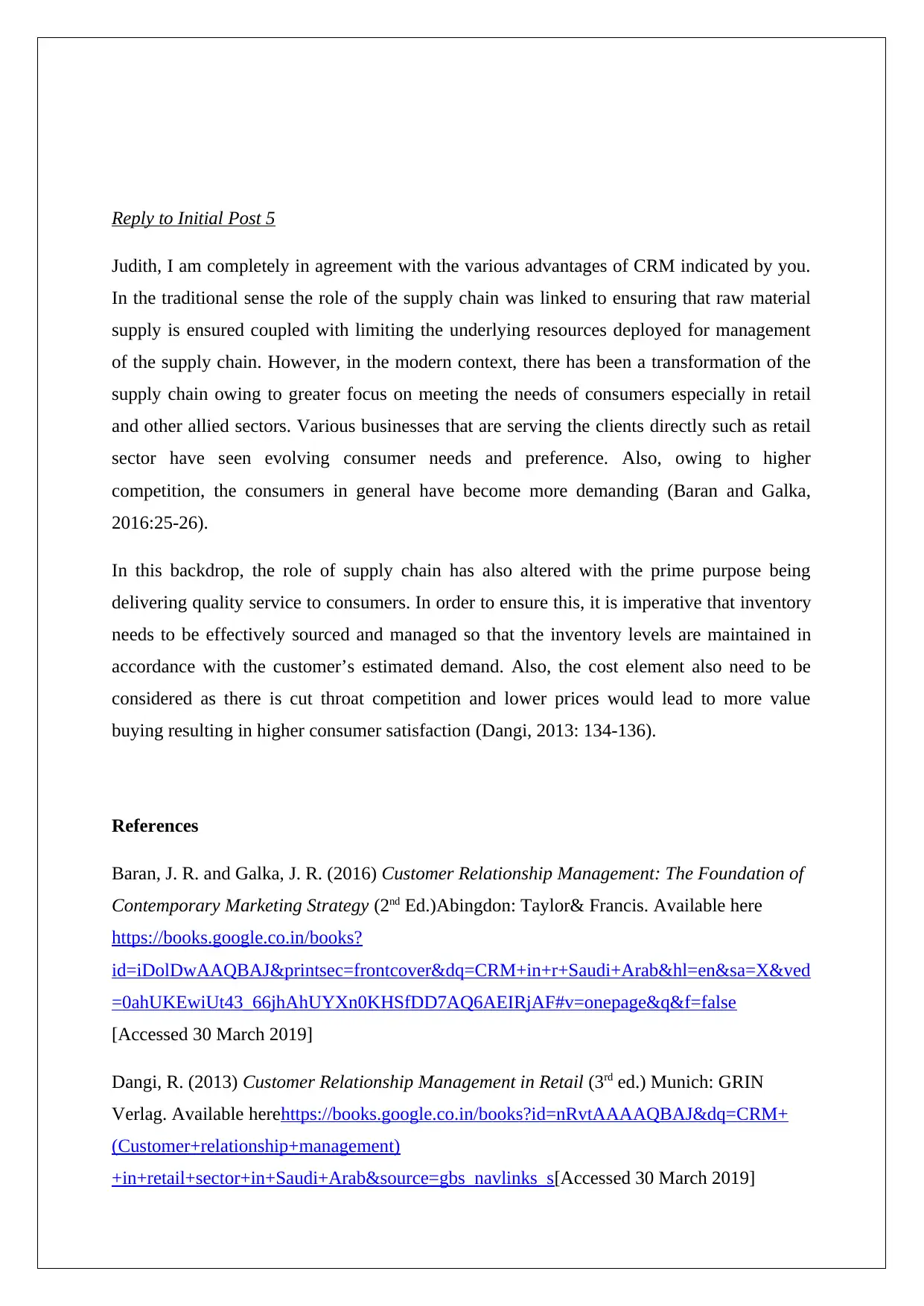
Reply to Initial Post 5
Judith, I am completely in agreement with the various advantages of CRM indicated by you.
In the traditional sense the role of the supply chain was linked to ensuring that raw material
supply is ensured coupled with limiting the underlying resources deployed for management
of the supply chain. However, in the modern context, there has been a transformation of the
supply chain owing to greater focus on meeting the needs of consumers especially in retail
and other allied sectors. Various businesses that are serving the clients directly such as retail
sector have seen evolving consumer needs and preference. Also, owing to higher
competition, the consumers in general have become more demanding (Baran and Galka,
2016:25-26).
In this backdrop, the role of supply chain has also altered with the prime purpose being
delivering quality service to consumers. In order to ensure this, it is imperative that inventory
needs to be effectively sourced and managed so that the inventory levels are maintained in
accordance with the customer’s estimated demand. Also, the cost element also need to be
considered as there is cut throat competition and lower prices would lead to more value
buying resulting in higher consumer satisfaction (Dangi, 2013: 134-136).
References
Baran, J. R. and Galka, J. R. (2016) Customer Relationship Management: The Foundation of
Contemporary Marketing Strategy (2nd Ed.)Abingdon: Taylor& Francis. Available here
https://books.google.co.in/books?
id=iDolDwAAQBAJ&printsec=frontcover&dq=CRM+in+r+Saudi+Arab&hl=en&sa=X&ved
=0ahUKEwiUt43_66jhAhUYXn0KHSfDD7AQ6AEIRjAF#v=onepage&q&f=false
[Accessed 30 March 2019]
Dangi, R. (2013) Customer Relationship Management in Retail (3rd ed.) Munich: GRIN
Verlag. Available herehttps://books.google.co.in/books?id=nRvtAAAAQBAJ&dq=CRM+
(Customer+relationship+management)
+in+retail+sector+in+Saudi+Arab&source=gbs_navlinks_s[Accessed 30 March 2019]
Judith, I am completely in agreement with the various advantages of CRM indicated by you.
In the traditional sense the role of the supply chain was linked to ensuring that raw material
supply is ensured coupled with limiting the underlying resources deployed for management
of the supply chain. However, in the modern context, there has been a transformation of the
supply chain owing to greater focus on meeting the needs of consumers especially in retail
and other allied sectors. Various businesses that are serving the clients directly such as retail
sector have seen evolving consumer needs and preference. Also, owing to higher
competition, the consumers in general have become more demanding (Baran and Galka,
2016:25-26).
In this backdrop, the role of supply chain has also altered with the prime purpose being
delivering quality service to consumers. In order to ensure this, it is imperative that inventory
needs to be effectively sourced and managed so that the inventory levels are maintained in
accordance with the customer’s estimated demand. Also, the cost element also need to be
considered as there is cut throat competition and lower prices would lead to more value
buying resulting in higher consumer satisfaction (Dangi, 2013: 134-136).
References
Baran, J. R. and Galka, J. R. (2016) Customer Relationship Management: The Foundation of
Contemporary Marketing Strategy (2nd Ed.)Abingdon: Taylor& Francis. Available here
https://books.google.co.in/books?
id=iDolDwAAQBAJ&printsec=frontcover&dq=CRM+in+r+Saudi+Arab&hl=en&sa=X&ved
=0ahUKEwiUt43_66jhAhUYXn0KHSfDD7AQ6AEIRjAF#v=onepage&q&f=false
[Accessed 30 March 2019]
Dangi, R. (2013) Customer Relationship Management in Retail (3rd ed.) Munich: GRIN
Verlag. Available herehttps://books.google.co.in/books?id=nRvtAAAAQBAJ&dq=CRM+
(Customer+relationship+management)
+in+retail+sector+in+Saudi+Arab&source=gbs_navlinks_s[Accessed 30 March 2019]
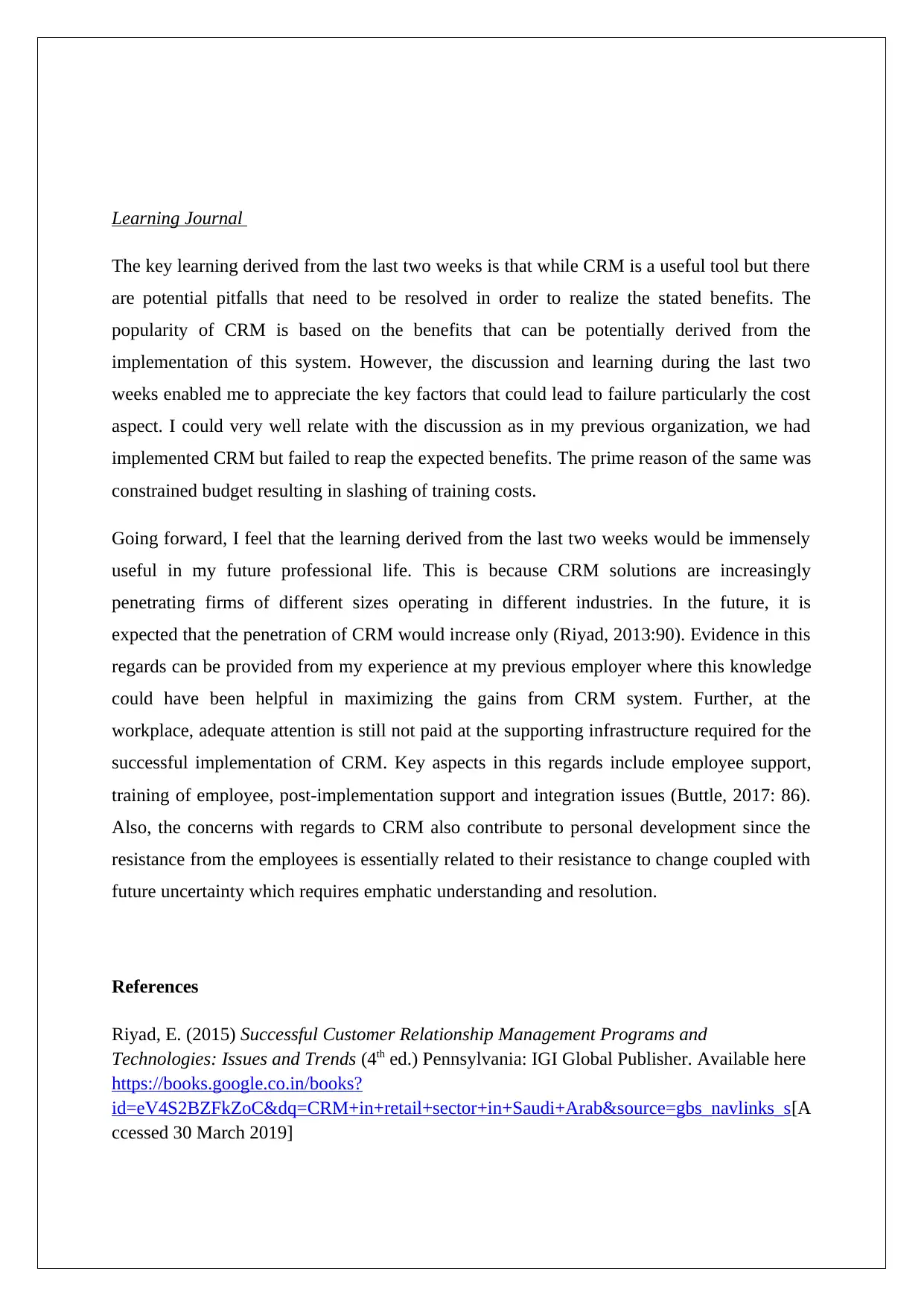
Learning Journal
The key learning derived from the last two weeks is that while CRM is a useful tool but there
are potential pitfalls that need to be resolved in order to realize the stated benefits. The
popularity of CRM is based on the benefits that can be potentially derived from the
implementation of this system. However, the discussion and learning during the last two
weeks enabled me to appreciate the key factors that could lead to failure particularly the cost
aspect. I could very well relate with the discussion as in my previous organization, we had
implemented CRM but failed to reap the expected benefits. The prime reason of the same was
constrained budget resulting in slashing of training costs.
Going forward, I feel that the learning derived from the last two weeks would be immensely
useful in my future professional life. This is because CRM solutions are increasingly
penetrating firms of different sizes operating in different industries. In the future, it is
expected that the penetration of CRM would increase only (Riyad, 2013:90). Evidence in this
regards can be provided from my experience at my previous employer where this knowledge
could have been helpful in maximizing the gains from CRM system. Further, at the
workplace, adequate attention is still not paid at the supporting infrastructure required for the
successful implementation of CRM. Key aspects in this regards include employee support,
training of employee, post-implementation support and integration issues (Buttle, 2017: 86).
Also, the concerns with regards to CRM also contribute to personal development since the
resistance from the employees is essentially related to their resistance to change coupled with
future uncertainty which requires emphatic understanding and resolution.
References
Riyad, E. (2015) Successful Customer Relationship Management Programs and
Technologies: Issues and Trends (4th ed.) Pennsylvania: IGI Global Publisher. Available here
https://books.google.co.in/books?
id=eV4S2BZFkZoC&dq=CRM+in+retail+sector+in+Saudi+Arab&source=gbs_navlinks_s[A
ccessed 30 March 2019]
The key learning derived from the last two weeks is that while CRM is a useful tool but there
are potential pitfalls that need to be resolved in order to realize the stated benefits. The
popularity of CRM is based on the benefits that can be potentially derived from the
implementation of this system. However, the discussion and learning during the last two
weeks enabled me to appreciate the key factors that could lead to failure particularly the cost
aspect. I could very well relate with the discussion as in my previous organization, we had
implemented CRM but failed to reap the expected benefits. The prime reason of the same was
constrained budget resulting in slashing of training costs.
Going forward, I feel that the learning derived from the last two weeks would be immensely
useful in my future professional life. This is because CRM solutions are increasingly
penetrating firms of different sizes operating in different industries. In the future, it is
expected that the penetration of CRM would increase only (Riyad, 2013:90). Evidence in this
regards can be provided from my experience at my previous employer where this knowledge
could have been helpful in maximizing the gains from CRM system. Further, at the
workplace, adequate attention is still not paid at the supporting infrastructure required for the
successful implementation of CRM. Key aspects in this regards include employee support,
training of employee, post-implementation support and integration issues (Buttle, 2017: 86).
Also, the concerns with regards to CRM also contribute to personal development since the
resistance from the employees is essentially related to their resistance to change coupled with
future uncertainty which requires emphatic understanding and resolution.
References
Riyad, E. (2015) Successful Customer Relationship Management Programs and
Technologies: Issues and Trends (4th ed.) Pennsylvania: IGI Global Publisher. Available here
https://books.google.co.in/books?
id=eV4S2BZFkZoC&dq=CRM+in+retail+sector+in+Saudi+Arab&source=gbs_navlinks_s[A
ccessed 30 March 2019]
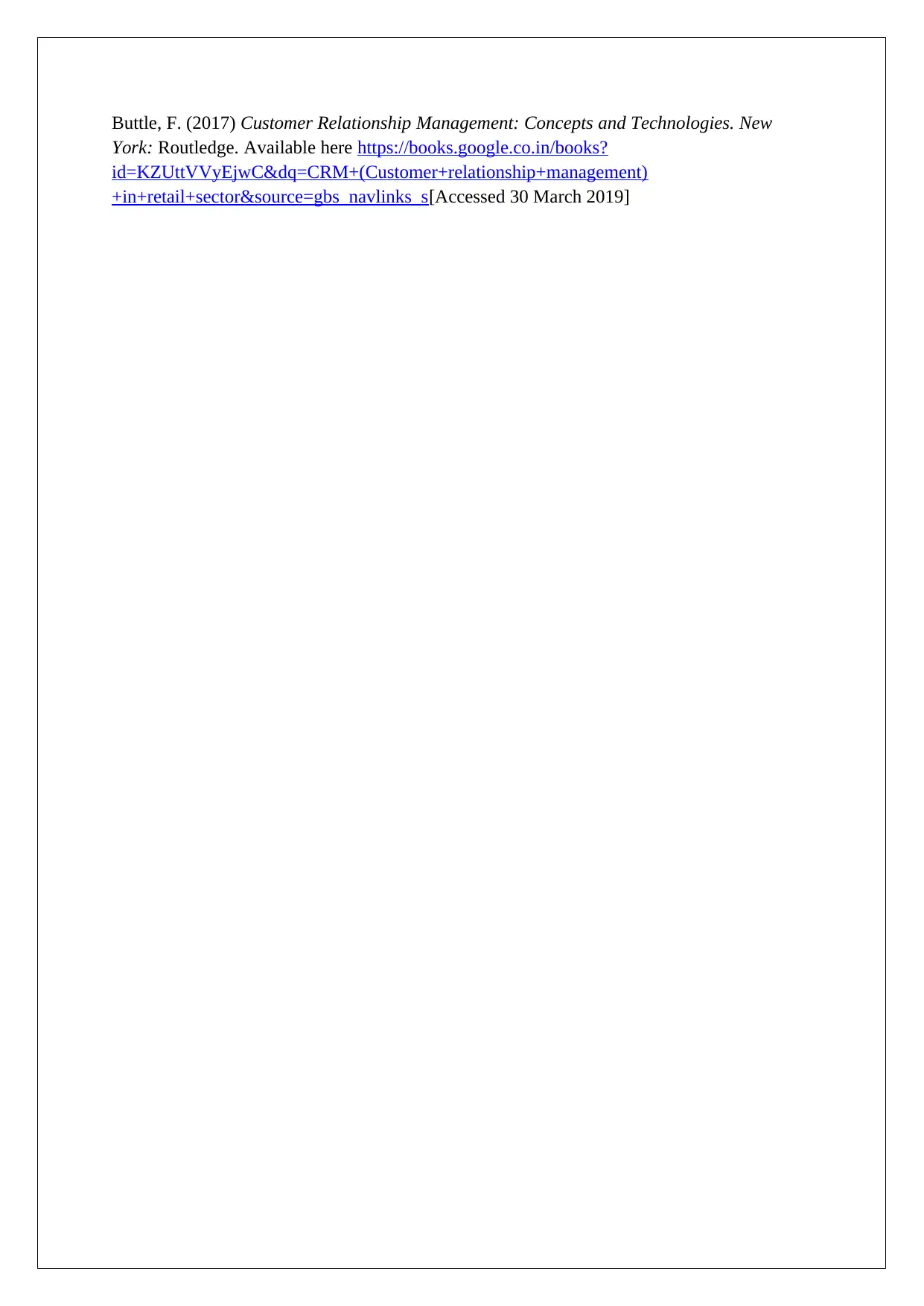
Buttle, F. (2017) Customer Relationship Management: Concepts and Technologies. New
York: Routledge. Available here https://books.google.co.in/books?
id=KZUttVVyEjwC&dq=CRM+(Customer+relationship+management)
+in+retail+sector&source=gbs_navlinks_s[Accessed 30 March 2019]
York: Routledge. Available here https://books.google.co.in/books?
id=KZUttVVyEjwC&dq=CRM+(Customer+relationship+management)
+in+retail+sector&source=gbs_navlinks_s[Accessed 30 March 2019]
1 out of 10
Your All-in-One AI-Powered Toolkit for Academic Success.
+13062052269
info@desklib.com
Available 24*7 on WhatsApp / Email
![[object Object]](/_next/static/media/star-bottom.7253800d.svg)
Unlock your academic potential
© 2024 | Zucol Services PVT LTD | All rights reserved.